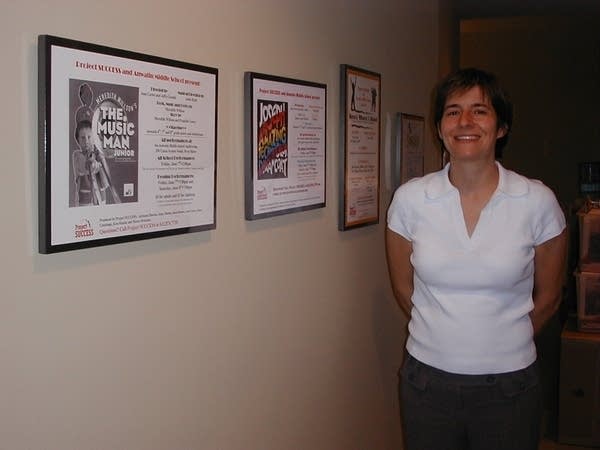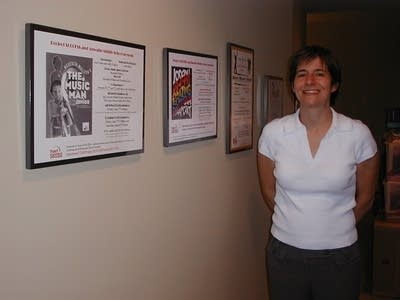Making art accessible to the poor: Remove the obstacles
Go Deeper.
Create an account or log in to save stories.
Like this?
Thanks for liking this story! We have added it to a list of your favorite stories.

Karen Awoleye is a receptionist at River Village Catholic Elder Care center in northeast Minneapolis. Olaweye is a radiant, smiling woman who laughs a lot, but she remembers back to a few years ago, when she hit a real low point in her life.
"I was on welfare," says Awoleye, "and I had all these five children. I was a divorced mother of five and there was a lot of gang stuff around us, a lot of drug selling. A lot of different things."

Awoleye says she was under incredible stress. She felt as though she wasn't able to be the parent that she wanted to be. That's when she discovered Project Success.
Project Success works to break down barriers so that people of all backgrounds can attend theater. Every month or so, Awoleye was able to take a break from her life and take her kids to the Guthrie, or Penumbra or Mu Performing Arts.
Turn Up Your Support
MPR News helps you turn down the noise and build shared understanding. Turn up your support for this public resource and keep trusted journalism accessible to all.
Awoleye says she started going with her family to Project Success events five or six years ago, and has been an avid participant ever since.
"This was an escape, this was a way that my children could be exposed to a different type of life. In other words, Project Success opened a window for my children. It's beautiful," she says.
Project Success works with Twin Cities middle school and high school students, using theater to help them talk about their lives, dream about their futures, and inform major life decisions. But Director Adrienne Diercks says its first job is to get families to the theater.

"For many families, it's an obstacle just getting it together with how busy things are with a hectic life -- maybe one parent that works the third shift and one that works the first shift," says Diercks. "To get all that organized, to say, 'We're going to set that aside to go to a play,' that can be difficult."
Project Success staff visit the classes and talk about the plays, getting the students interested in the stories. They then invite the students, and their friends and families, to see theater productions.
Last season, Project Success provided tickets to 21,000 students and family members. The tickets are free, and they're often good seats. Project Success also offers child care for younger siblings, transportation to and from the shows, and chaperones for those who need them.
Familiar faces greet the students at the door and welcome them to the theater. After the show, Project Success uses the play to talk to the students about real-life issues and decisions they might one day face.
This was a way that my children could be exposed to a different type of life. Project Success opened a window for my children.
Recently Awoleye took her family to see "Hamlet" at the Guthrie, something she says she could never afford to do on her own.
"It was so nice, because it gave us a chance to talk to each other," says Awoleye. "We talked about the relationship that the parents had with this young man, and how you can get things turned around in your head when things aren't really what you think it is. You should always communicate with each other to find out what things are really going on."
Awoleye laughs and shakes her head as she thinks back to that evening.
"We also learned about forgiveness," says Awoleye. "If something is bothering you and it's continually on your mind, it can drive you crazy. Because that's what we believed happened to him, to Hamlet. Oh poor Hamlet, he was so distressed!"
Awoleye says now that she's remarried and more financially stable, she'd like to volunteer for Project Success, perhaps once her kids have left the program.
Not everyone who participates in Project Success has been on welfare. That's part of its appeal. Project Success is free for everyone, so nobody has to apply for financial aid or is made to feel like a charity case. It draws in people from all different backgrounds.
Diercks says gradually, families begin to feel at home in the theater. They not only look forward to it, they take ownership of it. She now runs into former students taking their own children out to the theater. But still, she says, theaters can do more to make them feel welcome.
"When you invite somebody to come, are you really welcoming them into your space?" asks Diercks. "That's something we can always work on, mainly in just the way people might act. I think you have to be really sensitive, and that means getting to know people that you want to bring in as a new audience -- not making assumptions."
Diercks says sometimes the difference between being welcoming and unwelcoming is as subtle as a smile when someone asks for help.
But if theaters truly want to welcome new audiences, Diercks says it also means changing what's produced on stage. While "Hamlet" may have universal themes, she says she'd particularly like to see plays that reflect the modern lives and experiences of the students she brings to the theater.




